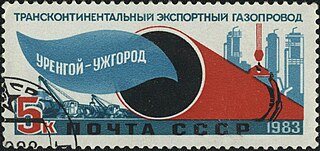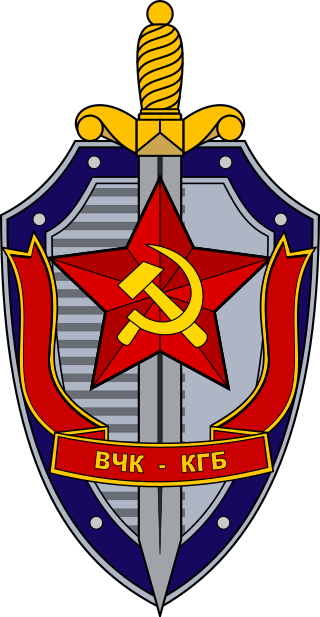Related Research Articles

Harold Adrian Russell "Kim" Philby was a British intelligence officer and a double agent for the Soviet Union. In 1963 he was revealed to be a member of the Cambridge Five, a spy ring which had divulged British secrets to the Soviets during World War II and in the early stages of the Cold War. Of the five, Philby is believed to have been most successful in providing secret information to the Soviets.

Sabotage is a deliberate action aimed at weakening a polity, government, effort, or organization through subversion, obstruction, demoralization, destabilization, division, disruption, or destruction. One who engages in sabotage is a saboteur. Saboteurs typically try to conceal their identities because of the consequences of their actions and to avoid invoking legal and organizational requirements for addressing sabotage.

Pipeline transport is the long-distance transportation of a liquid or gas through a system of pipes—a pipeline—typically to a market area for consumption. The latest data from 2014 gives a total of slightly less than 2,175,000 miles (3,500,000 km) of pipeline in 120 countries of the world. The United States had 65%, Russia had 8%, and Canada had 3%, thus 76% of all pipeline were in these three countries.
Intelligence assessment, or simply intel, is the development of behavior forecasts or recommended courses of action to the leadership of an organisation, based on wide ranges of available overt and covert information (intelligence). Assessments develop in response to leadership declaration requirements to inform decision-making. Assessment may be executed on behalf of a state, military or commercial organisation with ranges of information sources available to each.
The Farewell Dossier was the collection of documents that Colonel Vladimir Vetrov, a KGB defector "en place", gathered and gave to the Direction de la surveillance du territoire (DST) in 1981–82, during the Cold War.

A logic bomb is a piece of code intentionally inserted into a software system that will set off a malicious function when specified conditions are met. For example, a programmer may hide a piece of code that starts deleting files, should they ever be terminated from the company.

Active measures is a term used to describe political warfare conducted by the Soviet Union and the Russian Federation. The term, which dates back the 1920's, includes operations such as espionage, propaganda, sabotage and assassination, based on foreign policy objectives of the Soviet and Russian governments. Active measures have continued to be used by the administration of Vladimir Putin.
Oleg Danilovich Kalugin is a former KGB general. He was during a time, head of KGB political operations in the United States and later a critic of the agency. After being convicted of spying for the West in absentia during a trial in Moscow, he remained in the US and was sworn in as a citizen on 4 August 2003.
As early as the 1920s, the Soviet Union, through its GRU, OGPU, NKVD, and KGB intelligence agencies, used Russian and foreign-born nationals, as well as Communists of American origin, to perform espionage activities in the United States, forming various spy rings. Particularly during the 1940s, some of these espionage networks had contact with various U.S. government agencies. These Soviet espionage networks illegally transmitted confidential information to Moscow, such as information on the development of the atomic bomb. Soviet spies also participated in propaganda and disinformation operations, known as active measures, and attempted to sabotage diplomatic relationships between the U.S. and its allies.
Mitchell Gant is a fictional character in a series of books written by Craig Thomas. His first appearance occurs in the 1977 novel Firefox as a US Air Force major that steals a Russian MiG-31 Firefox fighter aircraft prototype. The prototype uses experimental interfaces between pilot and plane to allow for "thought-activated" flying and combat solutions. Gant, however, has to think in Russian to enable the technology to work.
Vladimir Ippolitovich Vetrov was a high-ranking KGB spy during the Cold War who decided to covertly release valuable information to France and NATO on the Soviet Union's clandestine program aimed at stealing technology from the West.

Thomas Care Reed was the 11th Secretary of the Air Force from January 2, 1976 to April 6, 1977 under Gerald Ford and Jimmy Carter. Previously he was a senior aide to Governor Ronald Reagan in California.
The "Mitrokhin Archive" is a collection of handwritten notes, primary sources and official documents which were secretly made, smuggled & hidden by the KGB archivist Vasili Mitrokhin during the thirty years in which he served as a KGB archivist in the foreign intelligence service and the First Chief Directorate. When he defected to the United Kingdom in 1992, he brought the archive with him, in six full trunks. His defection was not officially announced until 1999.
Countries with major counterintelligence failures are presented alphabetically. In each case, there is at least one systemic problem with seeking penetration agents when few or none may actually have existed, to the detriment of the functioning of the national service involved.

The Urengoy–Pomary–Uzhhorod pipeline is one of Russia's main natural gas export pipelines, partially owned and operated by Ukraine.
During the Cold War (1947–1991), when the Soviet Union and the United States were engaged in an arms race, the Soviet Union promoted its foreign policy through the World Peace Council and other front organizations. Some writers have claimed that it also influenced non-aligned peace groups in the West.

The Committee for State Security was the main security agency for the Soviet Union from 13 March 1954 until 3 December 1991. As a direct successor of preceding agencies such as the Cheka, GPU, OGPU, NKGB, NKVD and MGB, it was attached to the Council of Ministers. It was the chief government agency of "union-republican jurisdiction", carrying out internal security, foreign intelligence, counter-intelligence and secret police functions. Similar agencies operated in each of the republics of the Soviet Union aside from the Russian SFSR, where the KGB was headquartered, with many associated ministries, state committees and state commissions.

Farewell is a 2009 French espionage thriller film directed by Christian Carion, starring Guillaume Canet and Emir Kusturica. The film is loosely based on the actions of the high-ranking KGB official, Vladimir Vetrov. It was released in the United States in June 2010. It was adapted from the book Bonjour Farewell: La vérité sur la taupe française du KGB (1997) by Serguei Kostine.
The Chernobyl disaster was a catastrophic nuclear disaster that occurred in the early hours of 26 April 1986, at the Chernobyl Nuclear Power Plant in Soviet Ukraine. The accident occurred when Reactor Number 4 exploded and destroyed most of the reactor building, spreading debris and radioactive material across the surrounding area, and over the following days and weeks, most of mainland Europe was contaminated with radionuclides that emitted dangerous amounts of ionising radiation. On the night of April 25th and the early hours of April 26th, there had been 160 personnel on duty across the facility, while 300 more workers were on site at the building site of reactors 5 and 6.

On 26 September 2022, a series of clandestine bombings and subsequent underwater gas leaks occurred on the Nord Stream 1 and Nord Stream 2 natural gas pipelines. Both pipelines were built to transport natural gas from Russia to Germany through the Baltic Sea, and are majority owned by the Russian majority state-owned gas company, Gazprom. The perpetrators' identities and the motives behind the sabotage remain debated.
References
- 1 2 3 Markoff, John (October 26, 2009). "Cyberwar: Old Trick Threatens the Newest Weapons". The New York Times. Retrieved July 30, 2015.
- ↑ Medetsky, Anatoly (March 18, 2004). "KGB Veteran Denies CIA Caused '82 Blast". Moscow Times. Retrieved July 30, 2015.
- ↑ Hesseldahl, Arik; Kharif, Olga (October 10, 2014). "Cyber Crime and Information Warfare: A 30-Year History". Bloomberg Business. p. 2. Retrieved July 30, 2015.
- ↑ Weiss, Gus (1996). "The Farewell Dossier". CIA.
- 1 2 "ВЗРЫВ, которого… НЕ БЫЛО!" [An explosion, which… wasn't]. OGAS memorial site. 2011. Retrieved July 19, 2016.
- ↑ "At the Abyss: An Insider's History of the Cold War". Publishers Weekly . February 9, 2004. Retrieved May 27, 2016.